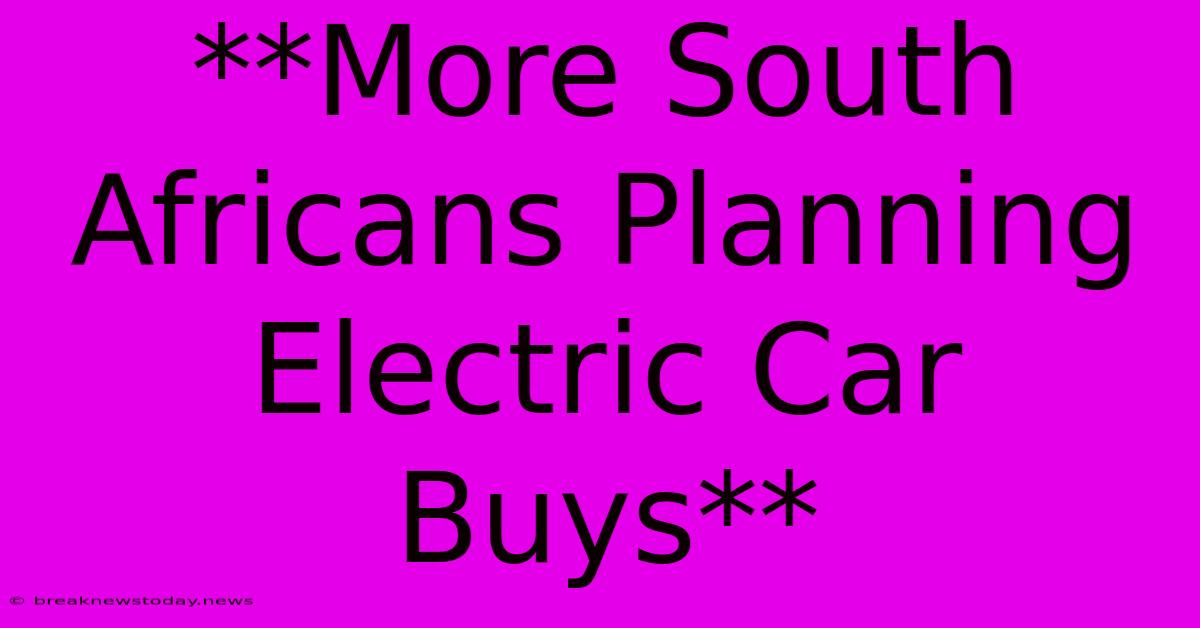**More South Africans Planning Electric Car Buys**

Discover more detailed and exciting information on our website. Click the link below to start your adventure: Visit Best Website naughtynakes.com. Don't miss out!
Table of Contents
More South Africans Planning Electric Car Buys: Is the Future Electric?
The South African automotive landscape is shifting gears, with a growing number of consumers embracing the electric vehicle (EV) revolution. Gone are the days when EVs were seen as a futuristic novelty; they are now a tangible reality, and more South Africans are actively planning to make the switch. This trend reflects a confluence of factors, including increasing awareness of environmental concerns, government incentives, and the growing affordability of EVs.
The EV Appeal: Why are South Africans Embracing Electric?
1. Environmental Consciousness: South Africans are increasingly attuned to the environmental impact of their choices. EVs, with their zero tailpipe emissions, present a compelling alternative to traditional gasoline-powered vehicles. By reducing their carbon footprint, drivers can contribute to a cleaner and healthier environment.
2. Government Incentives: The South African government has taken steps to encourage EV adoption. Incentives like tax breaks and subsidies are making EVs more financially accessible, enticing consumers to make the leap.
3. Affordability and Range: EVs are no longer just luxury vehicles. The market is expanding to include more affordable models, with ranges exceeding 300 kilometers on a single charge, making them practical for daily commutes and weekend getaways.
4. Lower Running Costs: EVs are cheaper to operate than traditional cars, with lower fuel costs and reduced maintenance needs. This economic advantage is a major selling point for many South Africans.
5. Technological Advancements: EV technology continues to evolve rapidly, with advancements in battery life, charging infrastructure, and performance making electric cars a more appealing proposition.
Challenges and Opportunities: The Road Ahead
While the future of EVs in South Africa looks bright, there are still challenges to overcome:
1. Charging Infrastructure: The availability of charging stations remains a significant hurdle. Expanding the network of public charging points is crucial to address range anxiety and make EVs more convenient for long-distance travel.
2. Electricity Grid Capacity: South Africa faces challenges with its electricity grid, and the increased demand from EVs requires careful planning and investment to ensure a stable and reliable power supply.
3. Cost of Battery Replacement: Battery replacement costs can be a concern for some consumers, but advancements in battery technology are leading to longer lifespans and reduced replacement costs.
Despite these challenges, the growing demand for EVs presents opportunities for South Africa's automotive sector and related industries. Investment in charging infrastructure, battery manufacturing, and EV-related services can create jobs and stimulate economic growth.
The Verdict: A Bright Future for Electric
More South Africans are planning to buy electric cars, driven by a desire for environmental responsibility, government incentives, and the growing affordability and practicality of EVs. The future of electric mobility in South Africa is promising, but overcoming challenges related to charging infrastructure and grid capacity will be crucial to accelerate the transition towards a cleaner and more sustainable transportation system.

Thank you for visiting our website wich cover about **More South Africans Planning Electric Car Buys**. We hope the information provided has been useful to you. Feel free to contact us if you have any questions or need further assistance. See you next time and dont miss to bookmark.
Featured Posts
-
Veer Zaara To Re Release Globally On November 7
Nov 02, 2024
-
Africas Poverty Lessons From Chinas Success
Nov 02, 2024
-
Islanders Gameday News Frustrate And Win
Nov 02, 2024
-
Ulm Vs Schalke Live 2 Bundesliga Heute Im Tv
Nov 02, 2024
-
Meningsmalingsfirma Om Georgia Valg Uansett Resultat
Nov 02, 2024
